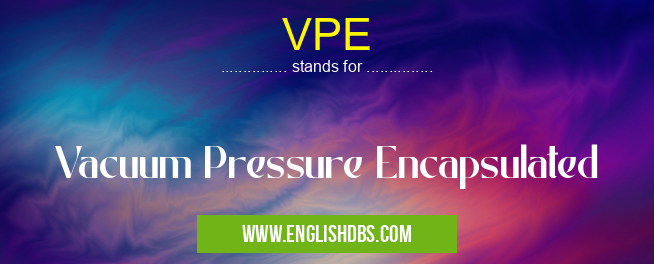What does VPE mean in UNCLASSIFIED
Vacuum Pressure Encapsulation (VPE) is a process used in various industries to improve the longevity, performance, and reliability of electronic components. It involves encapsulating the components in a vacuum environment to remove moisture, contaminants, and gases that can potentially degrade their performance.

VPE meaning in Unclassified in Miscellaneous
VPE mostly used in an acronym Unclassified in Category Miscellaneous that means Vacuum Pressure Encapsulated
Shorthand: VPE,
Full Form: Vacuum Pressure Encapsulated
For more information of "Vacuum Pressure Encapsulated", see the section below.
Process
The VPE process typically involves the following steps:
- Component Preparation: The electronic components to be encapsulated are cleaned and prepared to ensure a proper seal.
- Vacuum Chamber: The components are placed in a vacuum chamber, which is then sealed and evacuated to remove air and other gases.
- Encapsulation Material: A specialized encapsulation material, such as epoxy or silicone, is introduced into the vacuum chamber and surrounds the components.
- Curing: The encapsulation material is cured under controlled conditions to form a protective layer around the components.
Benefits
VPE offers several advantages:
- Moisture Resistance: The vacuum environment removes moisture, which can cause corrosion and premature failure of electronic components.
- Contaminant Protection: The encapsulation material forms a physical barrier against contaminants, such as dust, dirt, and chemicals.
- Improved Thermal Conductivity: The encapsulation material can enhance heat dissipation, reducing the risk of overheating.
- Increased Reliability: VPE helps protect electronic components from harsh environments, vibration, and mechanical stress.
Applications
VPE is commonly used in industries such as:
- Aerospace
- Automotive
- Medical
- Military
- Industrial Automation
Essential Questions and Answers on Vacuum Pressure Encapsulated in "MISCELLANEOUS»UNFILED"
What is Vacuum Pressure Encapsulation (VPE)?
Vacuum Pressure Encapsulation (VPE) is a manufacturing process that involves sealing electronic components or devices in an air-tight enclosure under vacuum conditions. This process creates a hermetically sealed environment, protecting the components from moisture, dust, and other environmental contaminants.
What are the benefits of VPE?
VPE offers several benefits, including:
- Enhanced protection: VPE creates a vacuum-sealed enclosure that keeps out moisture, dust, and other contaminants, ensuring the longevity and reliability of electronic components.
What types of materials are used in VPE?
VPE enclosures are typically made from high-quality materials such as:
- Metal: Metal enclosures provide excellent protection against physical damage and electromagnetic interference (EMI).
What industries use VPE?
VPE is used in various industries, including:
- Aerospace: VPE is essential for protecting electronic components in satellites and space vehicles from harsh environments.
Final Words: Vacuum Pressure Encapsulation (VPE) is a valuable process that extends the lifespan and improves the reliability of electronic components. By removing moisture, contaminants, and gases, VPE creates a protective environment that shields components from environmental factors and enhances their performance.
VPE also stands for: |
|
| All stands for VPE |
